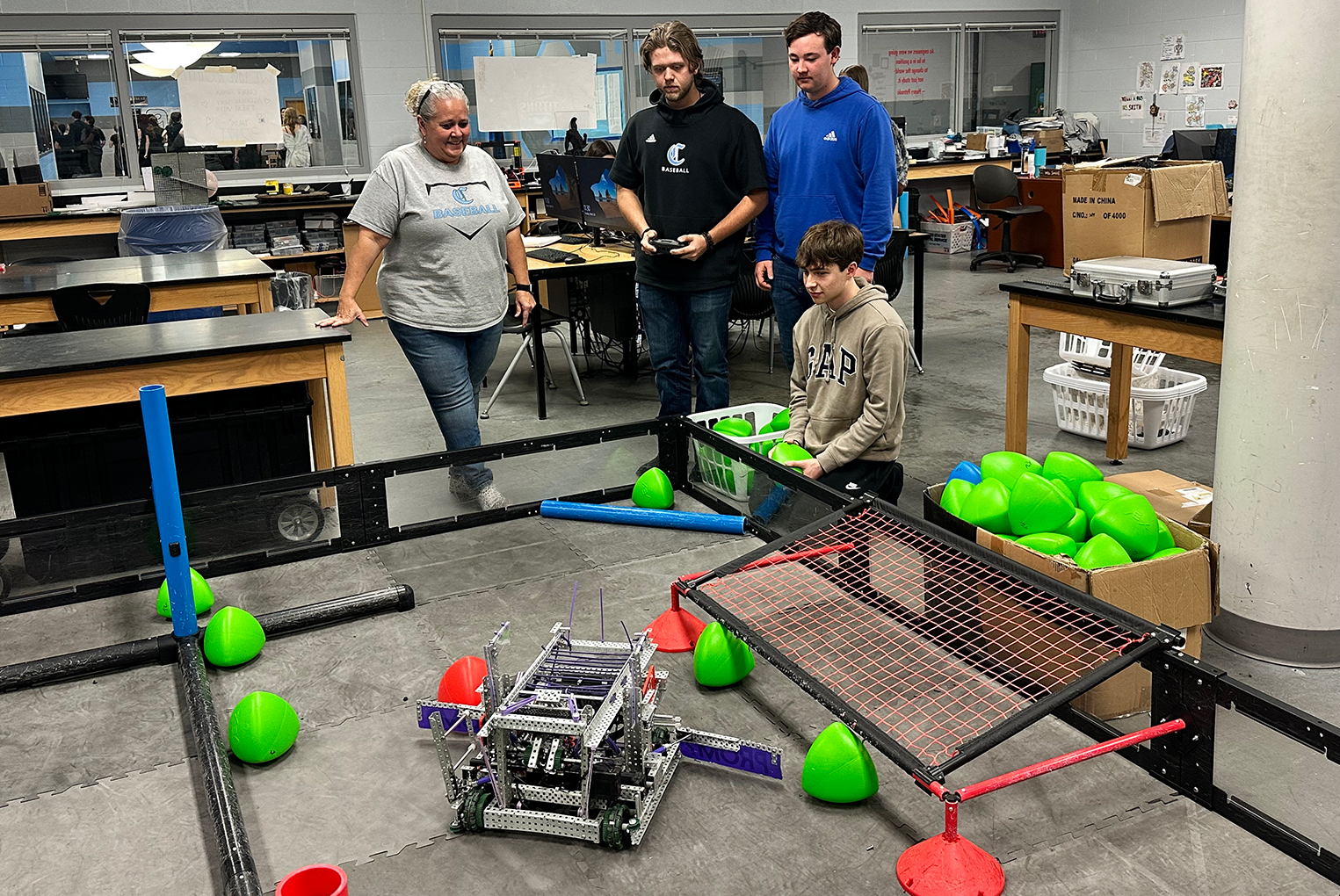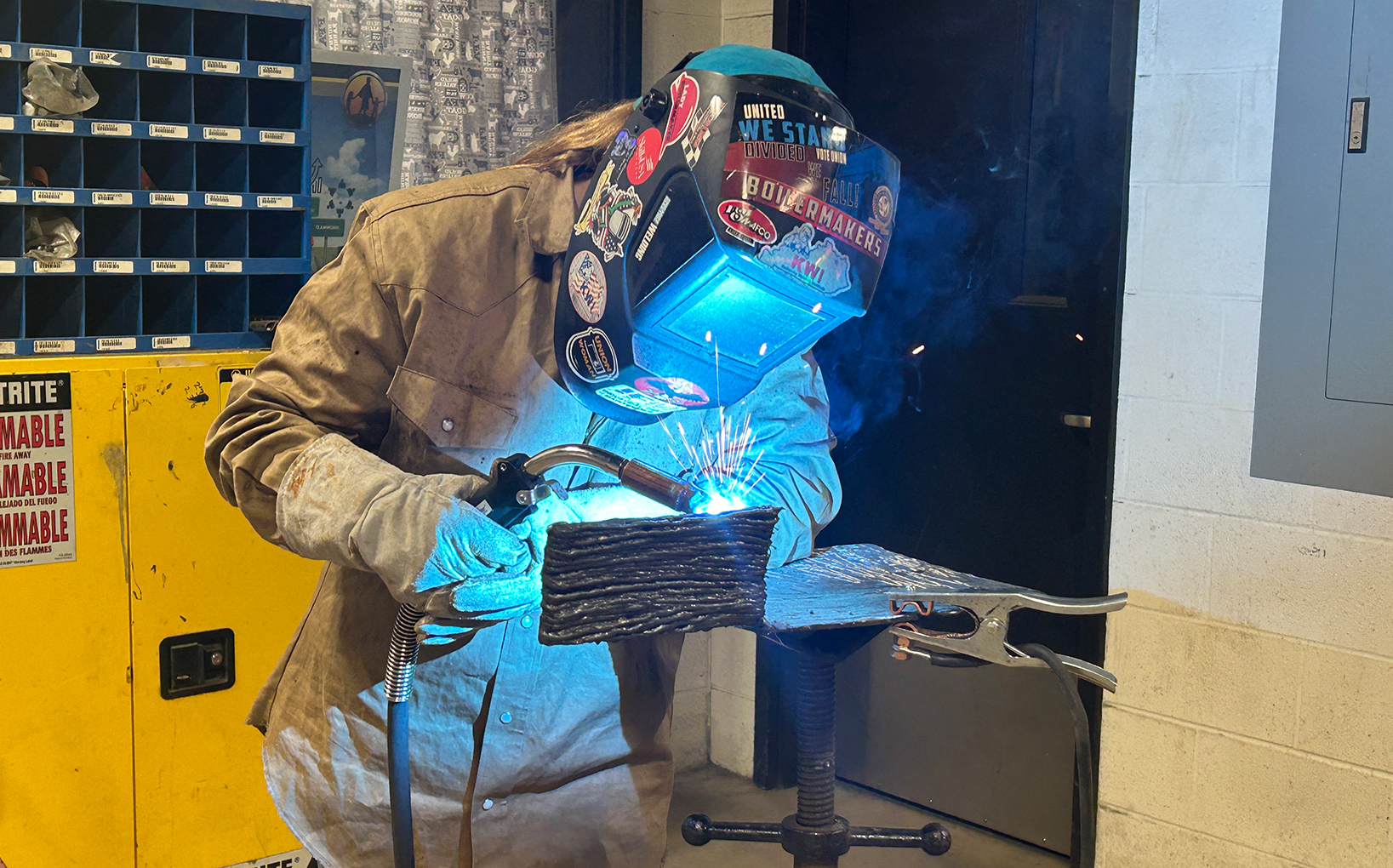
Michelle Hendricks, a teacher at Freedom Elementary School (Bullitt County), second from left, during a simulated mission at space camp. Photo submitted
By Susan Riddell
susan.riddell@education.ky.gov
Michelle Hendricks, a 4th grade teacher Freedom Elementary School (Bullitt County), spent a week at a summer space camp that she hopes will have a lasting impact on her classroom and teaching practices.
“This was an incredible week,” Hendricks said of Honeywell Space Academy for Educators camp she attended last July. “We were working and learning from sunrise to way after sunset – not just learning about space, but teaching techniques, ways of incorporating collaboration and getting content knowledge that we can use to be more specific, thorough and engaging with our students.”
Hendricks attended the camp at the U.S. Space and Rocket Center in Huntsville, Ala. It focused on space science and exploration, but incorporated teaching strategies appropriate for any classroom.
John Franklin, a mathematics intervention and physics teacher at Pulaski County High School, also participated in the space camp. He is interested in teaching an astronomy elective at his school next year, and he said he really benefitted from the two space mission simulations he experienced.
He also built and launched model rockets, extracted DNA, programmed a simple robot, designed a permanent space habitat, participated in a team ropes course and learned about “the history and future of flight, rockets and space travel,” he said.
“Since this camp was for teachers, I was able to ask teachers who teach my subject areas questions of all sorts,” Franklin said. “Lessons, classroom management, labs, afterschool programs, clubs and professional development opportunities were topics of most of my questions.
“I was able to compare and contrast procedures I had with not only teachers from America but from around the world,” he added. “I now have contacts from around the world in which to contact for information and resources.”
Hendricks agreed that the networking of the camp was a big plus, especially having global contacts.
She also praised the camp for filling in some of her content of knowledge gaps within space curriculum.
“It energized me with new ideas that I can bring back and share with my students,” Hendricks said. “Giving them real life examples and actual reasons for what we’re doing always help to make their learning more engaging.”
Some of Hendricks more memorable experiences at the camp included conducting experiments based on problems that NASA engineers had to overcome – including constructing heat shields for the shuttle and filtering urine so that it can be repurposed as drinking water.
They “nearly lost our cookies in the multi-axis trainer,” she said, “and that was just the first few days.”
Hendricks said one of her takeaways from the camp was just how important it is to create exciting and meaningful learning experiencing for her students. And while getting students excited about learning is one of the main goals teachers have, it’s also critical for teachers to get excited themselves about sharing content.
“There are lots of Common Core connections that I’ll have a much better grasp on teaching because of this experience,” Hendricks said. “But I don’t think the students’ benefits stop there. I think that experiences like this one re-engage teachers in their schools and in their classrooms. It lights a new fire and gets us excited again. An excited and engaged teacher is a definite benefit for students.”
For Franklin, that means wearing his space flight suit decorated with patches from the camp.
“Through my excitement, I want to inspire students to set high goals,” said Franklin, who started a rocket launching team at Pulaski County High this year. “Don’t tell me the sky’s the limit when there are footprints on the moon.”
Once the camp got her excited about returning to the classroom this fall, Hendricks made the decision to first incorporate small changes to her practices.
“Space Camp for Educators put a huge emphasis on cooperative learning and teamwork because without those things, NASA and the space program would never have happened,” she said. “I think these days a lot of kids aren’t used to or comfortable with working together, but it’s so important, because the world they’re growing up in won’t be one where people function in isolation. They have to learn to work and problem solve with everyone.
“As the year goes on, I look forward to bringing in more of the lessons I’ve learned in Space Camp,” Hendricks added. “Some I can transfer pretty easily, but some will take a bit of modification. Many of the experiences we had at camp can be adapted to any age group, and I’m looking to incorporate some of them into other subject areas as well.”
Both teachers have shared their experience informally in their schools or through work in professional learning communities.
“I have told every science and math teacher I know to apply for next year’s Honeywell Space Academy for Educators,” Franklin said.
MORE INFO…
John Franklin, john.franklin@pulaski.kyschools.us, (606) 679-1574
Michelle Hendricks, michelle.hendricks@bullitt.kyschools.us, (502) 869-3600



Leave A Comment